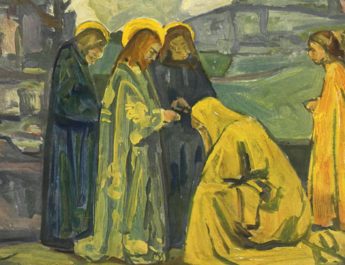Matthew 9:13
Narrative Lectionary 110
13 GoA and learnB what this means,C
A “go” = poreuomai. From poros (ford, passageway). This is to go, travel, journey, or die. It refers to transporting things from one place to another and focuses on the personal significance of the destination.
B “learn” = manthano. This is to learn, ascertain, understand. It is knowledge that one gets from personal experience and it implies reflecting on that experience. It can also focus on gaining knowledge by learning facts. This root is where the Greek word for disciple comes from (mathetes).
C “means” = eimi. This is to be, exist.
‘I desireD mercy,E not sacrifice.’F
D “desire” = thelo. This is to wish, desire, will, or intend. It is to choose or prefer in a literal or figurative sense. It can also mean inclined toward or take delight in. It can have a sense of being ready to act on the impulse in question.
E “mercy” = eleos. This is mercy, pity, tender mercy, or compassion, whether from humans or from God. This is mercy, generally understood in action by word or deed. When we sing or say “kyrie eleison” (Lord, have mercy), it is related to this word.
F “sacrifice” = thusia. From thuo (to breathe violently, seethe, rage; properly, to rush as breathing heavy; so smoke as in offering an animal sacrifice by fire; by extension, killing or slaying in general). This is a sacrifice or offering. It can refer to the act of sacrifice or the thig being sacrificed. Also, this is sacrifice in a literal or figurative sense.
For I have not comeG to callH the righteousI but sinners.”J
G “come” = erchomai. This is to come, go.
H “call” = kaleo. Related to keleuo (to command, order, direct); from kelomai (to urge on). This is to call by name, invite, to name, bid, summon, call aloud.
I “righteous” = dikaios. From dike (the principle of justice; that which is right in a way that is very clear; a decision or the execution of that decision; originally, this word was for custom or usage; evolved to include the process of law, judicial hearing, execution of sentence, penalty, and even vengeance; more commonly, it refers to what is right); may be from deiknumi (to show, point out, exhibit; figurative for teach, demonstrate, make known). This is correct, righteous, just, or a righteous person. It implies innocent or conforming to God’s standard of justice.
J “sinners” = hamartolos. From hamartano (to miss the mark, do wrong, make a mistake, sin); {from a (not) + meros (a part or share)}. This is sinning, sinful, sinner. It referred to missing the mark or falling short. The term was also used in archery for missing the target.
Image credit: “Volunteers with a Whale” by Florida Fish and Wildlife, 2012.




